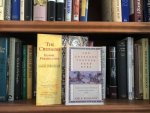The easiest way to avoid issues on some historical time is to look for a variety of books. Including sources from the period (also in the attached picture). There is no perfection, though.
okay first of all it's laughable to assume everyone is gonna go out of there way to read other books about the game they're about to play. I know some people are HUGE NERDS about D&D and making their settings, but that's not everyone.
And my point on Sword World was an example of even in Japan, Japanese playing a local RPG don't need Asian themed classes. The counterpoint is that maybe people in the USA want to escape into fantasy and be an Asian themed character.
1) that doesn't mean it doesn't happen, 2) it just so happens that the D&D brand of fantasy caught on in Japan, so much so that the genre as presented by games like D&D and Wizardry became the standard for Japanese fantasy stories. today your typical fantasy setting from a manga might barely resemble a medieval European society, but the underpinnings are still obvious.
same for us, D&D is still an American game, but it's not like the omission of classes like cowboy* and superhero** in a European-themed fantasy game is a huge issue to American gamers, and yet there are many RPGs covering both genres.
And as a story, one of my friends in Shanghai was an actor that made a good living being the token white guy in Chinese television shows and movies. And since I spend a lot of time in Nanjing, I saw double reinforced the Japanese are the villains.
I mean if he's cool with it, more power to him. if he wants less trivial roles, then that sucks. but to put things into perspective, imagine being an Asian American actor in a community that's been around for over a century, but the only role you can reasonably hope for is "token Asian guy" and you still might be passed over for someone not at all remotely Asian. and even if you do get the role you have to sit with the fact that it might not advance your career, meanwhile somebody else might get a lesser part that starts them down the path to stardom. up until recently this has been the case for most Asian Americans, and the existence of actors like George Takei and Lucy Liu doesn't change this fact.
*I guess AD&D does mention crossing over with Boot Hill, but that's considered weird even by what the book itself says.
**yes, I know in Chainmail you could have a unit called "Super hero", you can't gotcha me.
But this is what people find somewhat alarming about recent trends. Before it was folks who didn't understand RPGs speaking against them because they argued they were powerful tools that could open pathways to the devil or open pathways to mental instability. But now we essentially have people in the hobby making this kind of argument about games. I think a lot of people, myself included, simply don't think games have that kind of power

okay so, let me get this straight. someone like you who is in the RPG community didn't think the game had problems, but now that others in the community are pointing out problems you're worried? "I think a lot of people, myself included, simply don't think games have that kind of power" did it ever occur to you that maybe you're
wrong? that maybe a game that you enjoy that caters to people like you might not be as good when viewed on the inside with a different perspective?
EDIT: I want to emphasize I'm not
explicitly saying you're wrong, I'm just pointing out that you aren't apparently willing to accept the idea that differing views from other gamers are possibly valid.
(at least not unless you give them that power over yourself).
sorry, no, that's not how that works. if someone calls me a g**k or a ch*nk (or also in my particular case a b**ner as well) I don't get to decide whether or not it's an insult, it was already decided by the person who called me that. that's not how that works.



